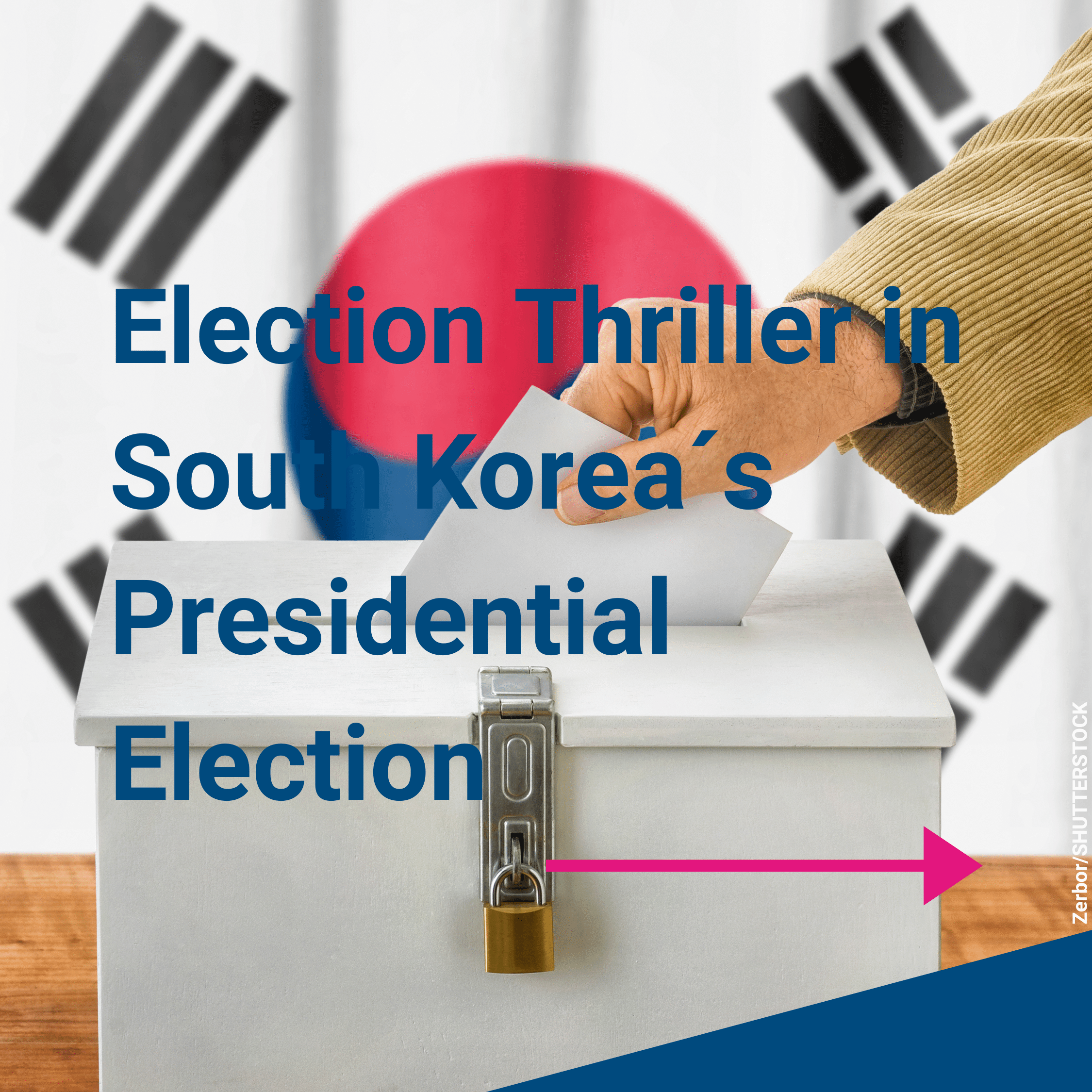South Korea Election
Narrow presidential election victory for conservative political newcomer

Zerbor/shutterstock
Election thriller in South Korea´s presidential election: Just 0.73 percent of the vote decided victory and defeat. With 48.56 percent of the vote, the candidate of the conservative People Power Party, Yoon Suk-yeol, won the election. He will be South Korea´s next president. His rival Lee Jae-myung, candidate of the ruling Democratic Party, received 47.83 percent of the vote. Nevertheless, he had to concede defeat. Despite the perceived disenchantment with politics among South Koreans, voter turnout was at 77 percent, similar to past elections. The election campaign had been marked by personal attacks and scandals. Where does the country go from here? FNF expert Sungeun Lim on the impact of this election result:
Ms. Lim, why was Yoon, a political novice, elected?
While Yoon is new to the political arena, he was a candidate of the established conservative opposition People Power Party. He was also very well known to the public, due to his former position as Prosecutor General.
His victory was largely due to the public's desire to hold the current government accountable. According to polls from last year, more than 50% of South Koreans favoured a change of government. The main reasons for this are the failure of the real estate policy - prizes continued to climb – as well as scandals involving important figures of the ruling camp.
The left-liberal camp was unable to counter this public sentiment with a convincing agenda for the future. Lee Jae-myung tried to distance himself from the current government, even by acknowledging the failure of the Moon Jae-in government's real estate policy. In the end, however, that was not enough to win the election.
The poor real estate policy was a decisive factor in Yoon's victory. He received about 330,000 more votes than Lee in Seoul, which has been hit hardest by soaring real estate prices. Since the 0.73 percent difference in votes between the two candidates is about 250,000 votes, the votes in Seoul might have been the decisive factor.
Never before has an election in South Korea been so close. What are the reasons?
There are several issues that have influenced the final election result, such as the last-minute departure of a centrist candidate, the rapid spread of the Omikron variant, and the increasing public attention to security issues due to the war in Ukraine. However, it´s unclear how these issues really did influence voters. What we do know is that the main reason for this close result was another issue: gender.
Given public opinion favouring a change of government, the conservative opposition candidate Yoon could have been heading for a decisive victory. However, many women did not favour him. Yoon promised to abolish the Ministry of Gender Equality and Family and to toughen penalties for false accusations of sexual assault. This led most female voters of all generations - except those over 60 - to turn away from Yoon and to vote for Lee as an alternative. This almost propelling Lee to victory, but not quite.
Gender confrontation was particularly evident in the 20-something age group. Among men in this age group, many of whom are critical of feminism, 59 percent voted for Yoon. Among women in the 20-something age group, the left-liberal Lee received 58 percent of the vote. This polarization contributed to the close election result.
Can we expect political changes?
When can expect several political decisions of the current government to be reversed.
There will be major changes regarding real estate policy. It is very likely that several government regulations and measures in the real estate market, which were aimed at protecting tenants and curbing housing speculation, will be rolled back. These interventions had unintentionally led to serious market distortions and thus to higher prices. Experts expect that providing more public and private housing will stabilize the market. In general, Yoon announced more economic deregulation.
Regarding foreign policy, the traditional alliance with the United States is expected to be strengthened. Thus, relations between South Korea and Japan, which have deteriorated for years, could also improve somewhat within the framework of the U.S.-Japan-Korea alliance. However, the conflict with North Korea could intensify further as Yoon seeks to distance himself from the Moon administration's appeasement policy, which has largely failed.
What lies ahead for Yoon now?
The president-elect faces strong opposition in parliament. The Democratic Party, which has now lost the presidency, still controls 172 of 300 parliamentary seats. Thus, the opposition can exert massive influence on national politics. Yoon must cooperate with the opposition party or he could face problems in many areas. Passing new laws and electing the prime minister will be challenges. Yoon has already stated that he would cooperate with the opposition party. Whether he will succeed in doing so remains to be seen. In the past, there have been fierce disputes and blockades in parliament, both under conservative and under left-liberal governments.
In recent years, South Korea´s society has been extremely polarized in terms of ideology, generation, gender and income. This election has further exacerbated this confrontation between the camps. The gender conflict is emerging to be one of the most serious social problems in Korea. Overcoming the extreme social divide seems far from easy. The close election result shows that both sides have almost the same number of supporters. However, the call for social unity has become even louder. It will be crucial for Yoon to narrow the social rifts within the population and to find a way to cooperate with the opposition.
*Sungeun Lim is Program Manager for South Korea at the Friedrich Naumann Foundation for Freedom Korea office, based in Seoul.
